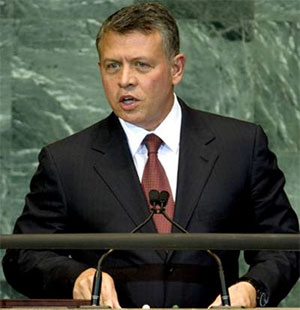Editor’s Note – The Middle East is a house of cards with a base that is unsustainable as we see Syria in its civil war and about to fall. Yet, Jordan is likely next, having a land full of refugees, terror groups, and an infrastructure that is failing to keep pace with managing and governing.
EU concerned about potential instability in Jordan
BY ANDREW RETTMAN
BRUSSELS – With all eyes on violence in Syria, some EU countries are becoming increasingly concerned about the risk of instability in neighbouring Jordan.
A senior EU diplomatic contact told this website on Wednesday (8 February) that the Arab Spring is taking a nasty turn inside one of the West’s main allies in the region. “The problem now is if things get worse and spill into Jordan,” the source said.
Ruled by King Abdullah II – better known abroad for his high society wife, Queen Rania – the Bedouin tribes which form the bulk of Jordanian society and its security forces have been grumbling about the royal clique’s monopoly on wealth and power for the past year.
In recent weeks, they stopped calling for reform and started calling for the king to step down.
“The mood has shifted quite sharply. There is a loss of support in the Bedouin bedrock which is turning quite antagonistic at this stage … I am not saying it’s on the brink of instability, but there has been a qualitative change,” Alastair Crooke, a former EU advisor on Middle East security affairs who now runs an NGO in Lebanon, told EUobserver.
“It’s another artificial state. It’s a very fragile country,” Ali Ben-David, a defence expert for Israel’s Channel 10 TV station, said.
With Jordan currently home to some 750,000 reguees from Iraq, including some Islamist radical groups, he added that if Jordan begins to unravel, it could create a security nightmare for Israel. “Tens of thousands of terrorists in Iraq lost their job and they are looking for their next target … If things begin spilling into Jordan, you could get both Al-Qaeda and the Iranian revolutionary guard camped on the other side of the Jordan river,” he said.
North of the border in Syria, some 2,500 EU citizens are believed to be still in the country amid escalating violence.
Around 90 percent are dual EU-Syrian citizens and are expected to see out the crisis no matter what happens.
France – a former colonial power in Syria – has the largest group among the remaining 10 percent. The French foreign ministry says that despite reports of mass-killings in Homs over the past weekend, the situation in the rest of the country has not significantly deteriorated.
“We haven’t started the launch code for an evacuation. We haven’t even closed our embassy. The only thing we’ve done is recalled our ambassador for consultations, which is a political gesture,” a French diplomat said.
Meanwhile, Lebanon – the most volatile country in the region in contemporary history – is looking the most stable for the time being.
A speech on Tuesday by Hassan Nasrallah – the chief of the main military power in Lebanon, Hezbollah – in which he said he does not take orders from Iran, might mean he will not start a war with Israel to take the heat off his allies in Damascus and Tehran.
The British foreign office says people should avoid all but essential travel to anywhere east of the mountains which bisect Lebanon from north to south, due to risk of kidnapping and Syrian military incursions.
For his part, Crooke, who lives in Beirut, said a traveller would have to go well off the beaten track into militant training camps in the foothills, Palestinian refugee camps in the south or smuggler villages which straddle the Lebanon-Syria border, to get into trouble.
“If you are using ordinary routes, the Bekaa valley [the eastern half of the country] is quite normal – people are crossing it every day to go to Damascus and back,” he said.


